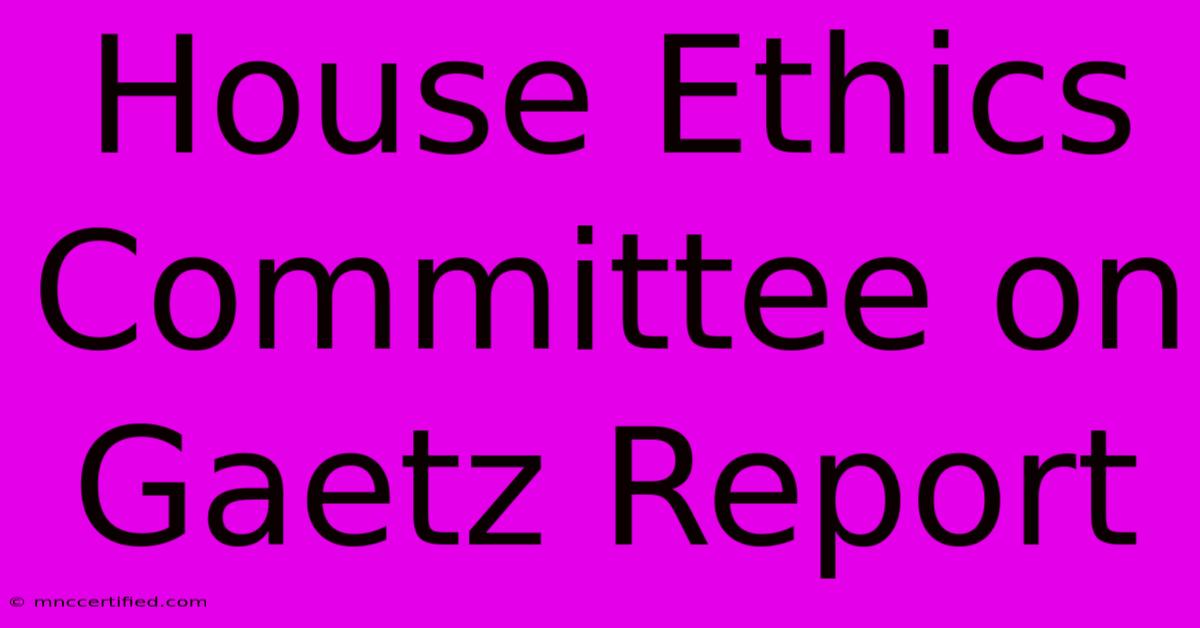House Ethics Committee On Gaetz Report

Table of Contents
House Ethics Committee on Gaetz Report: A Deep Dive into the Investigation
The House Ethics Committee's investigation into Representative Matt Gaetz has been a subject of intense public scrutiny and media coverage. This article provides a comprehensive overview of the investigation, its findings (or lack thereof), and its implications for both Representative Gaetz and the integrity of the House of Representatives. We will examine the key allegations, the committee's process, and the ongoing debate surrounding the case.
The Allegations Against Representative Gaetz
The investigation into Representative Gaetz stemmed from allegations of sexual misconduct and potential violations of House ethics rules. These allegations, initially reported by various news outlets, included claims of a relationship with a minor and potential sex trafficking. It's crucial to remember that these were allegations, and the House Ethics Committee's investigation was designed to determine their validity.
The specifics of the allegations are complex and varied. They involved multiple individuals and spanned a period of time, making the investigation particularly challenging. The committee had to meticulously examine evidence, interview witnesses, and navigate legal complexities to reach a conclusion.
The House Ethics Committee's Investigation Process
The House Ethics Committee operates under strict rules and procedures to ensure fairness and due process. The committee's investigation likely involved:
- Gathering evidence: This included reviewing documents, financial records, and communications.
- Interviewing witnesses: The committee interviewed individuals who may have had relevant information, including Representative Gaetz himself.
- Legal review: The committee's legal counsel played a crucial role in ensuring the investigation adhered to legal standards and ethical guidelines.
The process is designed to be thorough and impartial, but the timeline can be lengthy and often shrouded in secrecy due to the sensitive nature of the information involved. Transparency is a key concern in such investigations, and the public's right to know is often balanced against the need to protect the privacy of individuals involved.
The Committee's Report and its Findings
The House Ethics Committee ultimately released a report detailing its findings. The nature of this report is crucial to understand the impact of the investigation. Did the report fully exonerate Representative Gaetz? Did it find evidence of wrongdoing? Or did the committee conclude that insufficient evidence existed to support the allegations?
The specific contents of the report, once released, should be carefully examined to understand the committee's conclusions and the reasoning behind them. This includes evaluating the evidence presented, the committee's assessment of witness credibility, and the overall assessment of the allegations.
Implications and Ongoing Debate
Regardless of the committee's findings, the investigation into Representative Gaetz has had significant implications:
- Impact on Representative Gaetz's political career: The allegations and the investigation itself have undoubtedly affected his public image and political standing.
- Public perception of the House of Representatives: The investigation highlights concerns about ethical conduct within Congress and the need for accountability.
- Future investigations: The investigation may set precedents for future inquiries into allegations of misconduct by members of Congress.
The debate surrounding the Gaetz investigation is likely to continue long after the release of the committee's report. The differing interpretations of the evidence and the committee's conclusions will fuel ongoing discussions about ethical standards in politics and the effectiveness of the House Ethics Committee's processes.
Further Research: To fully understand the nuances of this complex situation, further research is encouraged. Review the official report from the House Ethics Committee (once available), analyze media coverage from reputable news sources, and examine the legal arguments presented by all parties involved. Understanding the context and the different perspectives is vital to forming a well-informed opinion.
Disclaimer: This article provides an overview of the House Ethics Committee's investigation into Representative Matt Gaetz. It is not intended to be legal advice and should not be substituted for independent research and analysis. The information presented here is based on publicly available information at the time of writing and may be subject to change.

Thank you for visiting our website wich cover about House Ethics Committee On Gaetz Report. We hope the information provided has been useful to you. Feel free to contact us if you have any questions or need further assistance. See you next time and dont miss to bookmark.
Featured Posts
-
Trump Nominates Herschel Walker As Ambassador
Dec 19, 2024
-
Relationship Rumors Cardinals Player Responds
Dec 19, 2024
-
Record 825 M Mega Millions Prize
Dec 19, 2024
-
Trumps Ambassador Pick Herschel Walker
Dec 19, 2024
-
Farage Musk Backs Our Project
Dec 19, 2024